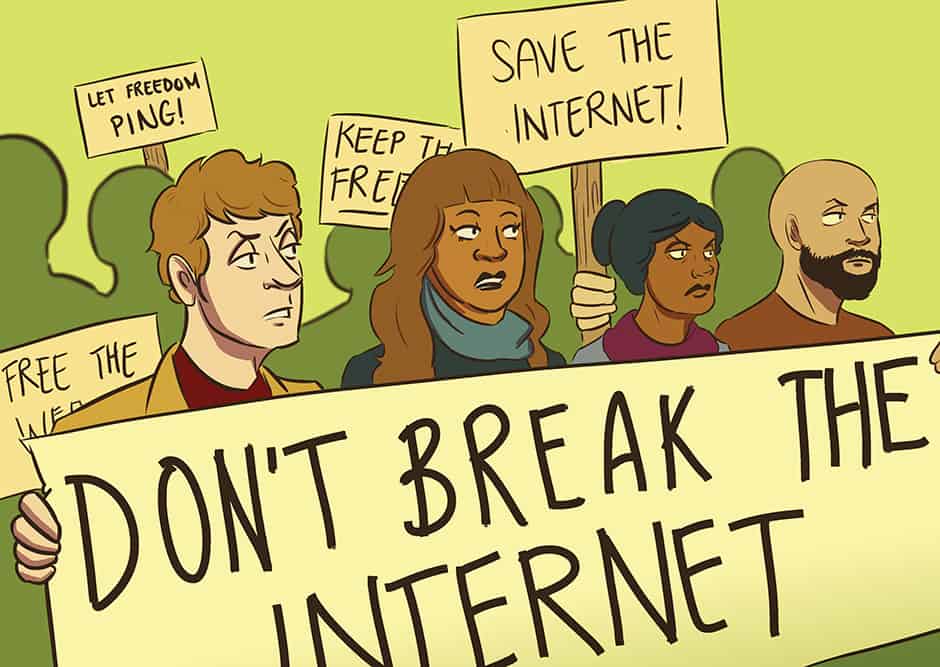Net neutrality is a guiding principle for Internet Service Providers (ISPs) that is simple to grasp: according to the Oxford Dictionaries, ISPs must permit “access to all content and applications regardless of their source, and without favouring or blocking particular products or websites.”
A free Internet is crucial. The Internet is a platform for communication and education. Everyone is given a fair chance to share their voice and discover a variety of opinions. However, recent months have seen a question raised: is it appropriate for corporations responsible for the provision of Internet access to censor or alter that access for profit?
Currently, major telecom companies such as Comcast and AT&T have banded together to pass new regulations that would create a two-tiered system for Internet speeding. They want to create a fast lane and a slow lane. The fast lane is essentially the speed most of us know now. The purpose of these lanes is to monopolize the fast lane for big corporations and entrepreneurs and push the everyday individual into the slower lanes. If you want access to the fast lane or certain websites, you dish out more money to your ISP. This whole concept is analogous to cable TV. Everyone pays basic fees for the basic channels; if you want access to networks outside of that, you have to pay extra.
The United States’ Federal Communications Commission (FCC) is the governing body for all sources of the Internet in that country and in control when it comes to passing the aforementioned regulations. However, there is a significant flaw in the organization. Tom Wheeler, who was appointed to chair the FCC by President Barack Obama, is the former chief executive officer of a major telecom company, representing a serious conflict of interest in the lobbying relationship between the government and ISPs.
Increasing rates are an even greater threat to students, burdening their already scant budgets. Additionally, ISPs cannot simply be boycotted, given that the Internet is such an integral part of our daily lives.
Christopher Malmo, an executive member of OpenMedia — a Canadian non-partisan, non-profit advocacy group tasked with promoting a free Internet — and frequent contributor to VICE, commented on the topic in an email interview with The Varsity: “Net neutrality is massive because it’s the way the Internet has always worked. If ISPs are allowed to slow and speed up different content, they can basically extort everyone and make us all pay for data twice: once on the consumer side, and again on the web service side. These smaller players don’t have the resources to fight in court, and their traffic would drop off because people abandon web pages that take more than a few seconds to load. Losing net neutrality would be bad for innovation, bad for the economy, bad for our connection to one another, and bad for democracy.”
Thankfully, Obama has recently come out in favour of net neutrality, thanks to a multitude of organizations, such as Open Media, that are fighting for the right to our privacy and Internet. Over 5.1 million people spoke out through online petitions and comments on the FCC’s website. Efforts were also made by entities such as Netflix, which have been extorted by companies such as Comcast for more money in exchange for optimal access speeds. As a result, the decision thus far has been prolonged and several regulations are being revisited.
For the time being, and at least until February 26, the Internet remains neutral in the US. However, the critical FCC decision will be released at the end of next month to determine whether or not ISPs are within their rights to constrict Internet access. “Students can get involved by joining online activist groups, taking part in demos, and writing their representatives. They can create meshnets and promote open source software. They can create clever pages and games online to build awareness. Lately, there were colossal protests in Hungary against a proposed new Internet tax — the protesters accomplished a great deal. This proves that it’s still a world that we can change.” says Malmo.
Members of the U of T community also have the potential to start a Canadian post-secondary fight for a free Internet. Such decision-making is revolutionary for students. The easiest way to get involved is to leave a comment on the FCC website or get involved with advocacy organizations such as OpenMedia. The more voices that accumulate, the louder the message will be for a free Internet, and the sooner we will be heard.
Maitri Gupta is a third-year student at UTSC studying neuroscience and mental health.


